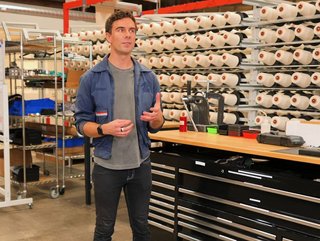Walmart Targets Waste with Unspun 3D Fabric Weaving Tie-Up

When she meditates on her firm’s 3D weaving technology, Beth Esponnette, Co-founder and Chief Product Officer at unspun, finds herself thinking about Cinderella.
She pictures the scene where the fairy godmother waves her wand and a sparkling blue gown takes shape around the princess-to-be.
What unspun is doing with its Vega 3D weaving technology, in partnership with Walmart, works kind of like that, says Beth.
For, while traditional methods of apparel production require fabric to be cut and stitched, unspun’s first-of-its-kind 3D weaving technology goes straight from yarn to garment and eliminates waste generated by the process, like fabric loss, discarded inventory and transport emissions.
Chinos will be the 3D weaving pioneers
Unspun says the “thrilling innovation” has the potential to solve industry challenges, unlock and create skilled jobs, meet consumer demand for locally made garments and deliver transparency and sustainability in the apparel supply chain.
Walmart is collaborating with unspun on a pilot project to explore how its Vega 3D weaving technology could be used in its supply chain, first applying it to create men’s chinos.
In order to drive growth and supply, unspun aims to have 3D weaving machines at microsites across the US, with a goal of 350 machines in use by 2030.
Little has changed over the years in how clothing is produced. Yarn is spun into a flat fabric that is cut based on a pattern and sewn together, with the excess fabric wasted, in a multi-step cycle taking place all around the world.
This cut-and-sew model also requires businesses to carry excess inventory due to the guessing game of consumer demand and ever-changing trends.
What a waste
“One big problem with the clothing industry today is that because clothing is made before people want it, excess inventory has to be produced,” says Beth.
There will be no leg seams in the 3D-woven chino, making for a stronger and lighter product, and labels will be woven into the garment instead of sewn in, creating greater comfort.
Kevin Martin, co-founder and chief technology officer, unspun, said: “We were connected with Walmart because as we start talking about the ability to produce in the US on demand, there are very few people thinking about that as actively as Walmart.”
Not stopping at apparel
“Walmart seeking out a company like ours and collaborating in such a deep manner validates the immensity of the problem, the potential of the technology and the solution and how pioneering Walmart is,” says Walden Lam, co-founder and chief executive officer, unspun.
A Walmart spokesperson said: “Fighting this waste stream in the apparel industry is a significant global challenge that we’re aiming to tackle at Walmart.
“In 2023, we announced a pilot project with Rubi Laboratories to explore incorporating their patent-pending carbon capture process into our supply chain and convert carbon emissions into thread used in a garment prototype.
“But we’re not stopping at the apparel industry.”
Walmart’s goal is to be powered 50% by renewable energy in its own operations by 2025 and 100% by 2035.
The spokesperson said: “In 2017, we announced a bold ambition to work with our suppliers to reduce, avoid or sequester one gigaton — that’s 1 billion metric tons — of greenhouse gas emissions in product value chains by 2030.
“On 21 February, with the help of more than 5,900 suppliers, we announced we’ve reached that goal – six years ahead of schedule.
******
Make sure you check out the latest edition of Sustainability Magazine and also sign up to our global conference series - Sustainability LIVE 2024
******
Sustainability Magazine is a BizClik brand
******






